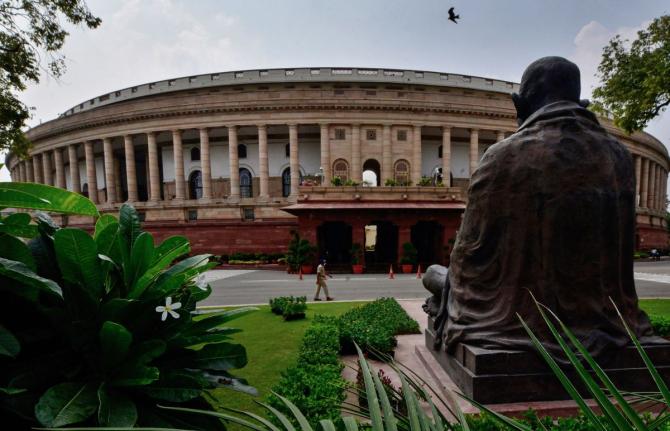Both the BJP and the Congress have banked on new and young faces, some of whom have been nominated by the parties for the first time.

The ruling Bharatiya Janata Party's strength in the crucial upper house of Parliament has fallen from the current 95 to 92 while the number of Congress members has gone up slightly from 29 to 31 after results of the just-concluded Rajya Sabha elections.
In the biennial elections to the Council of States that which witnessed a keen contest in four states of Rajasthan, Haryana, Karnataka and Maharashtra on Friday, the BJP won 22 of the 57 vacancies while the Congress won nine seats.
From among the 57 retiring members, the BJP had 25 of its members and the Congress had seven who will retire by next month and new ones will replace them.
Both the BJP and the Congress have banked on new and young faces, some of whom have been nominated by the parties for the first time.
With more strength, the Congress which nominated younger faces is expected to be more aggressive in the coming days in the upper house.
The BJP's strength includes four nominated members who have opted to be with the ruling party.
The BJP will have the support of seven more nominated members. These seven seats are currently vacant.
The BJP will also have the support of independent Kartikeya Sharma, whom it backed during the just concluded polls in Haryana.
It had also supported independent Subhash Chandra, who has lost from Rajasthan this time. Chandra's current term ends on August 1.

Among other regional parties, the strength of YSR-Congress which is in power in Andhra Pradesh, has gone up from the current six to nine seats, while that of Aam Aadmi Party which is in power in Delhi and Punjab will now have the strength of 10 seats in the upper house.
The strength of other regional parties like the Dravida Munnetra Kazhagam, the Biju Janata Dal, theTelangana Rashtra Samithi, the Janata Dal-United, the Nationalist Congress Party and the Shiv Sena also remains the same as their candidates won as many seats as those who retired.
While the DMK has 10 members in the Rajya Sabha, the BJD has nine, the TRS has seven, the JDU has five, the NCP has four and the Shiv Sena has three.
The strength of the Trinamool Congress and Communist Party of India-Marxist remains the same with 13 and 5 members respectively.
The All India Anna Dravida Munnetra Kazhagam, which currently has five members in the Council of States will now have four as it won only two while three of its members have retired.
The strength of the Samajwadi Party has gone down from the current five to three in the RS, as it has given its seats to independent Kapil Sibal and Rashtriya Lok Dal leader Jayant Chaudhary.
The Rashtriya Janata Dal with more seats in the assembly will also have one more member now, raising the strength to six from the current five.
The Bahujan Samaj Party will now has only one member in the upper house, down from three currently.
While Jharkhand Mukti Morcha, which had only one member current will now have two and Shiromani Akali Dal which had two members will not have any member in the Rajya Sabha as all its MPs are retiring.
Some of the prominent names who will return to the Rajya Sabha after their re-election are Union ministers Nirmala Sitharaman and Piyush Goyal and P Chidambaram, Jairam Ramesh (both Congress), Kapil Sibal (Independent), Misa Bharti (RJD), Praful Patel (NCP) and Sanjay Raut (Shiv Sena).
Besides, the Congress has brought some new names including Randeep Surjewala and Imran Pratapgarhi, while its leaders Mukul Wasnik, Rajeev Shukla, Ranjeet Ranjan and Pramod Tiwari have earlier been Parliamentarians.
The winners from Uttar Pradesh are Jayant Chaudhary (RLD), Javed Ali Khan (SP), Darshana Singh, Babu Ram Nishad, Mithilesh Kumar, Radha Mohan Dal Agarwal, K Laxman, Laxmikant Bajpai, Surendra Singh Nagar, Sangeeta Yadav (all BJP).
All five candidates from Bihar were elected unopposed -- Misa Bharti and Faiyaz Ahmed (RJD), Satish Chandra Dubey and Shambhu Sharan Patel (BJP), and Kheeru Mahto (JD-U).
Bharti, the eldest daughter of RJD supremo Lalu Prasad, and Dubey shall be enjoying their second consecutive terms.
V Vijayasai Reddy, Beeda Masthan Rao, R Krishnaiah and S Niranjan Reddy of the ruling YSR Congress were also elected unopposed from Andhra Pradesh. With this win, the strength of the YSRC has now increased to nine in Rajya Sabha, out of 11 from the state, with the Telugu Desam Party and the BJP having one member each.











 © 2025
© 2025